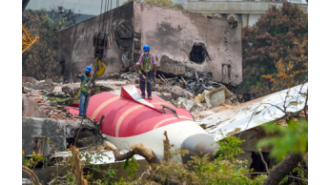Thousands of dogs are homeless and perishing due to flood damage caused by a powerful typhoon.
Witnessing deceased dogs decaying in cages is a sight that will remain etched in my memory forever.

As the powerful Typhoon Gaemi ravaged the Philippines in July, its devastating effects were felt by both humans and animals alike. While thousands of people were forced to evacuate their homes, countless dogs were left behind, chained to lamp posts or confined in cages outside. These dogs were left defenseless against the brutal storm, and many of them did not survive.
Ashley Fruono, the director of animal assistance programs for PETA Asia, was on the ground during the rescue efforts and witnessed the horrifying aftermath. She recalls seeing decomposing bodies of dogs, still chained up with a look of terror on their faces. It was a heartbreaking scene that could have been prevented if their owners had taken proper precautions.
Unfortunately, animal abuse is a major issue in the Philippines, a country that is home to millions of dogs. Despite increased awareness and concern for animal welfare, there were still over 3,000 cases of animal maltreatment reported in 2020. Ashley, who has lived in the Philippines for 17 years, explains that many of these cases involve dogs who are left outside, chained up and neglected by their owners.
During natural disasters like Typhoon Gaemi, these dogs are especially vulnerable. As the storm raged on, Manila, the capital of the Philippines, was hit hard and many dogs were left to suffer in the elements. While some were lucky enough to be rescued, others were not as fortunate and perished due to the harsh conditions.
Ashley explains that cruelty to animals is a major concern in the Philippines. She describes the heartbreaking sight of dogs chained up outside their owner's homes, forced to eat, sleep, and relieve themselves in the same spot for days on end. This is often due to crowded living conditions, making it difficult for owners to keep their dogs inside.
In the case of Typhoon Gaemi, many evacuation centers did not allow pets, forcing owners to make the difficult decision of leaving their beloved companions behind. This was a major issue for animal rescue workers, who were already working with limited resources and tight budgets. However, Ashley notes that this is slowly starting to change, as some evacuation centers and even government rescue boats are now accepting animals.
Despite these efforts, many dogs still faced a terrifying fate during the storm. Some were found stranded on rooftops, while others were rescued from the floodwaters. Many were malnourished and suffering from diseases, such as mange and worms. One such dog, Carina, was found by a family sheltering in their home and was taken in by PETA Asia for medical treatment and foster care.
As the country continues to rebuild after Typhoon Gaemi, the issue of animal welfare remains a top concern for Ashley and her colleagues. They work tirelessly to rescue and rehome animals like Carina, giving them a second chance at a better life. As Ashley puts it, animals are family members who should never be left behind in chains or cages, especially during times of emergency.
2 Views










